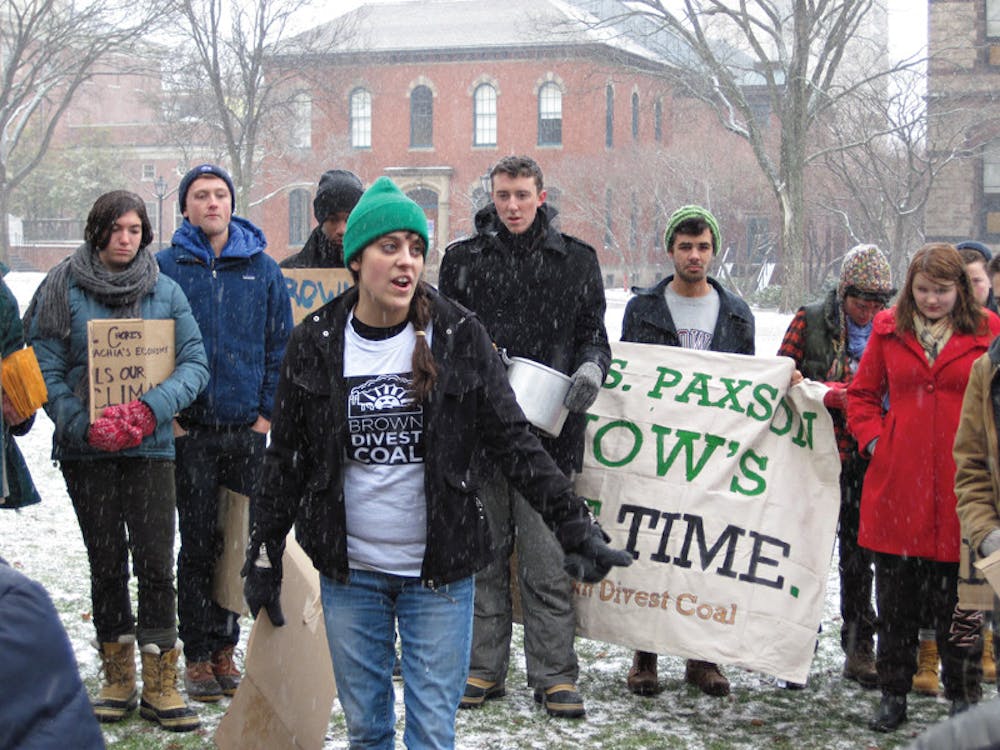Members of Brown Divest Coal and the campus community took to the Main Green Friday morning to rally against the University’s alleged fossil fuel investments. The rally was planned to coincide with the Corporation meeting originally scheduled to take place that day, said Emily Kirkland ’13, one of the group’s student organizers.
As snow began to fall, the protesters chanted the slogans “Brown take action, stop extraction!” and “Look around, it’s sleeting, the Corporation’s meeting, the world is overheating — divest now!”
“We wanted (the Corporation members) to literally hear us,” said Nathan Bishop ’13, a member of Brown Divest Coal.
Speakers — including members of the campaign — discussed reasons for the University to divest from coal companies, which have appalling environmental and worker safety practices, Kirkland said.
The turnout was somewhat lower than anticipated, which Kirkland attributed to the early time, 10 a.m., and the impending blizzard. She said she was still impressed by the 80 to 90 students who attended the protest, which aimed to “demonstrate the depth of our students’ support.”
Visiting Assistant Professor in Environmental Studies Professor Dawn King was also in attendance. She said she acts as an informal faculty adviser to Brown Divest Coal and joins rallies as a speaker and to support students, many of whom she has taught.
The rally attendees did not interact with the Corporation, though Provost Mark Schlissel P’15 made an appearance at the end of the meeting, Kirkland said.
Schlissel said he spoke briefly with two student members of the group, who handed him a letter outlining the group’s demands, including a call to the University to “commit to addressing the remaining fossil fuel investments it holds,” according to the letter.
“The goal is to hurt these companies,” King said, adding that amid national discussions about renewable energy, it is impossible to address questions of sustainability until society moves away from fossil fuels.
The Corporation meeting began at 7:30 a.m. and ended just before 9:30 a.m., Schlissel said. He said he first became aware of the rally while working in his office after the Corporation session ended, at which time most of its members had dispersed.
Students were screaming and yelling, “but also engaging people respectfully,” Schlissel said.
“We had a lot of volume,” said James Stomber ’15, who also attended last semester’s Divest Coal rally and added that “this (rally) felt a lot more serious.”
The University has never explicitly acknowledged any investments in coal companies, but interactions between Brown Divest Coal and President Christina Paxson have indicated that the University does have connections with these companies, Kirkland said.
The details of the University’s investments are not released to the general public, but Kirkland said the University has said it has an “energy portfolio.”
“Their lack of response is a very, very clear sign,” said Kristy Choi ’15, a student organizer.
At the beginning of November, the group presented to the Advisory Committee on Corporate Responsibility in Investment Policies — a University organization that presents diverse campus recommendations about ethical investments of the endowment — asking them to recommend the University divest from the coal industry. This is the only method the University offers as a way to make campus voices heard by the Corporation, Bishop said.
Members of ACCRIP have demonstrated support for Divest Coal’s cause. The group expects ACCRIP to release a letter of recommendation within about a week, Choi said.
“The rally really hopes to put the pressure on ACCRIP and the Corporation more generally,” Kirkland said.
Schlissel said that did not recall a formal item about coal or ACCRIP on the Corporation meeting agenda, adding that the Corporation’s upcoming conference call will focus on more time-sensitive issues.
After ACCRIP provides its statement, Divest Coal plans to continue to encourage Paxson and the Corporation to carry out the recommendation, Choi said.
The University has previously agreed to divest in tobacco, Darfur and HEI Hotels following recommendations by ACCRIP, Kirkland said.
Brown Divest Coal has been collecting signatures for its online petition since its inception in September, Kirkland said, adding that the group held a “dorm storm” in Grad Center Thursday night to provide information to students about ways to guide the University toward cleaner investment practices.
“Most schools, like Brown, are not transparent about their endowment,” Kirkland said.
Brown Divest Coal is part of a larger national movement — involving over 230 campuses — which aims to pressure administrations to divest from fossil fuel companies. The organizations at two small schools, Sterling College and Unity College, have succeeding in convincing their institutions to divest, Choi said.
“It’s not healthy, it’s not safe, and it’s not an economically viable investment,” Choi said.

ADVERTISEMENT




